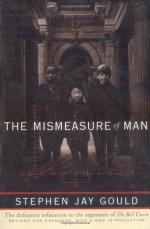
|
| Name: _________________________ | Period: ___________________ |
This test consists of 5 multiple choice questions, 5 short answer questions, and 10 short essay questions.
Multiple Choice Questions
1. Which Socrates work is Gould discussing at the opening of this book?
(a) Euthyphro
(b) Republic
(c) Phaedo
(d) Apology
2. People with ______ had smaller brain sizes than those who were suddenly killed in accidents.
(a) low iron
(b) diseases
(c) AIDS
(d) children
3. Broca also thought that ________ should be denied the benefits of education due to smaller brains.
(a) children
(b) elderly people
(c) women
(d) leaders
4. What was Francis Galton's book published in 1869?
(a) Hereditary Explorations
(b) Hereditary Genius
(c) Hereditary and Race
(d) Hereditary Genus
5. Bean felt that the ______, or front part of the brain, was smaller in women than in men.
(a) corpus callosum
(b) genus
(c) amygdalla
(d) frontal lobe
Short Answer Questions
1. Blumenbach believed differences in races might be linked to __________.
2. What kind of disease can cause the brain to diminish in size before death?
3. The answer to #48 also tried to show the entities with a higher ranking had to repeat the _________ of those with lower ranking.
4. Flaws in the experimental design, according to Gould, do not lead to _________ in the numbers.
5. Leaders of the eighteenth and nineteenth century did not dispute __________.
Short Essay Questions
1. What did Gould find to be the main problem with Paul Broca's work?
2. Describe and define the idea of biological determinism.
3. What does Gould want to define ranking as?
4. Who was Serres, in relation to the polygenism movement? What did he study and find to be true?
5. What were some of the additional factors Gratiolet studied in order to determine the effect of brain size?
6. What are some of the arguments that have been used to justify the rankings of people in society?
7. What did Robert Bennett Bean study as an investigator into craniometry?
8. What are the two views that resulted in the study of racial inferiority?
9. What are 2 of the four points Gould keeps in mind as he examines the studies of the researchers in this book?
10. What is Socrates' idea as to how classes and categories will be formed in relation to people in a society?
|
This section contains 586 words (approx. 2 pages at 300 words per page) |

|




